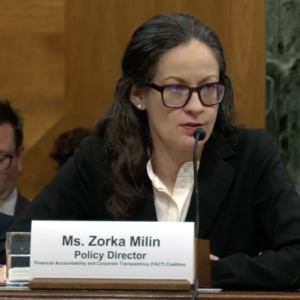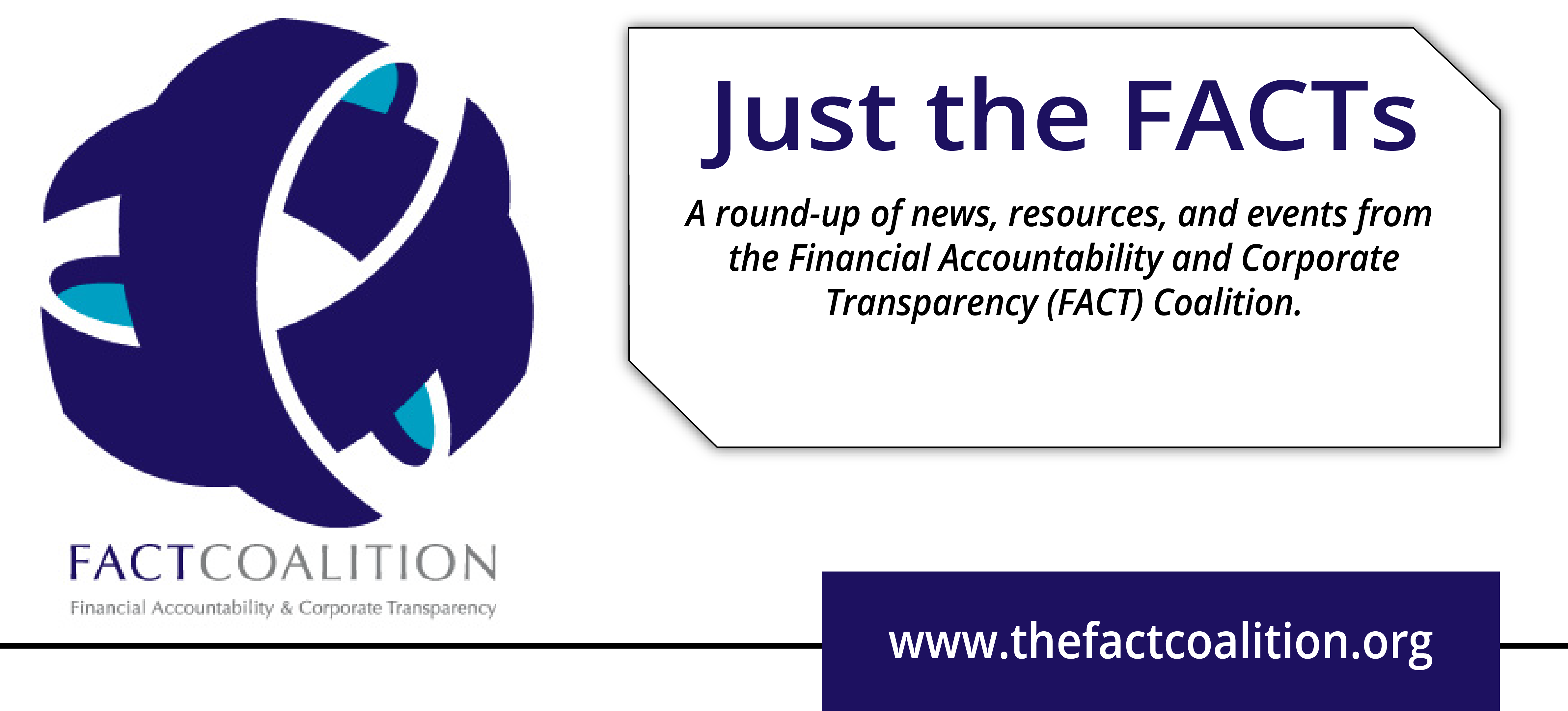“Just the FACTs” is a round-up of news stories and information regarding efforts to combat corrupt financial practices, including offshore tax haven abuses, corporate secrecy, and money laundering through the financial system.
Send feedback or items for future newsletters to Thomas Georges at tgeorges@thefactcoalition.org
Here is the State of Play
FACT Applauds Treasury’s Move to Close Decades-Old Money Laundering Loopholes

In official comments submitted earlier this week, FACT applauded Treasury’s introduction of long-awaited draft anti-money laundering (AML) safeguards for the $50 trillion U.S. real estate market and certain investment advisers in the $130 trillion investment fund sector. Following the successful launch of the nation’s first entity ownership database in January, finalizing these draft rules for as-of-yet largely uncovered sectors represents perhaps the most substantial step that Treasury’s Financial Crimes Enforcement Network (FinCEN) could take to insulate the U.S. financial system from laundered funds.
Alongside FACT, Treasury’s pair of new proposed rules were broadly praised by a wide range of stakeholders, with statements of support lodged by U.S. senators, attorney generals, affordable housing, national security, and anti-corruption groups. Though these comments were largely positive, a number of FACT’s recommendations and concerns were consistently echoed by others, including the need for expanded AML safeguards for commercial real estate purchases. Other critical recommendations include:
For Real Estate
- Providing greater enforcement clarity surrounding reporting requirements. Critically, the proposed rule does not explicitly identify the penalties for failing to file required information, or for filing inaccurate information. These penalties must be clarified in the final rule; and
- Improving the Real Estate Report required for covered transactions to include information relevant to money laundering risks. In particular, the Report should require the filer to verify beneficial ownership information reported by covered entities, as well as to determine the source of funds provided by the recipient entity for a given transaction.
For Investment Advisers
- Adding family offices. Family offices employ investment advisers to transfer enormous sums around the world at the direction of wealthy individuals, posing inherent AML risks. Such offices have already presented money laundering risks in other jurisdictions with advanced investment advisory industries; and
- Adding foreign private advisers. Covering foreign private advisers with U.S. clients that would otherwise remain unregulated under the proposed rule would help to close a potential money laundering avenue, and foreclose competition between U.S. and non-U.S. investment advisers based on who has AML obligations.
In addition to finalizing these rules, FinCEN has also declared its intention to release a new proposed rule implementing AML safeguards for commercial real estate purchases – a major omission from the current real estate proposal – this fall.

FACT Senate Testimonies Highlight Importance of International Tax, Money Laundering Reforms
Two members of the core FACT secretariat team, policy director Zorka Milin and government affairs director Erica Hanichak, testified in the Senate last week on offshore tax evasion and beneficial ownership transparency, respectively. These testimonies provided opportunities for FACT to highlight progress that has been made on our twin policy pillars of international tax and anti-money laundering reform, as well as to press for further reforms.
A Suite of Tax Reforms on Center Stage
Milin’s testimony before the Senate Budget Committee focused on offshore tax evasion and avoidance strategies employed by both individuals and U.S.-based multinational corporations, including the use of secretive foreign bank accounts and elaborate company classification schemes that allow multinationals to avoid taxation on certain profits.
Too often, the wealthy and big corporations evade paying what they owe by hiding their income in offshore tax havens.@ZorkaMilin of @FACTCoalition on who pays the price. https://t.co/Rm7auBIvia pic.twitter.com/FtmuzU0QKD
— Senate Budget Committee (@SenateBudget) April 10, 2024
Her recommendations spanned various legislative and regulatory measures, including the need for additional funding for the Internal Revenue Service (IRS) to effectively analyze and act upon data collected under the 2010 Foreign Account Tax Compliance Act (FATCA), using beneficial ownership information for tax-enforcement purposes, increasing corporate tax accountability through public country-by-country reporting, and repealing existing loopholes allowing U.S. multinationals to effectively “hide” certain subsidiaries from the IRS.
During questioning, Senator Chris Van Hollen (D–MD) thanked Milin for raising the issue of public country-by-country reporting (CbCR), a long-held FACT priority, which would shed light on the tax strategies of multinational companies. Senator Van Hollen’s Disclosure of Tax Havens and Offshoring Act, would require the Securities and Exchange Commission (SEC) use its existing authority to require public CbCR for major U.S. multinationals, in line with international best practices.
Now: @ChrisVanHollen asks FACT's @ZorkaMilin about the value of public tax reporting (called country-by-country reporting) for investors looking to evaluate tax risks in their portfolios.
— FACT Coalition (@FACTCoalition) April 10, 2024
Milin: "It would help investors better assess these very material risks." pic.twitter.com/tMpQmOZrpx
Public CbCR, he noted, is useful not just for lawmakers looking to better craft tax policy aimed at curbing multinational offshore tax evasion, but also for investors who need such information to assess material risks to their portfolios arising from tax reform and enforcement efforts. Aggressive tax planning by multinationals can cost investors massive sums: the IRS is currently seeking $29 billion in additional tax liability from Microsoft, $10 billion from Amgen, $9 billion from Facebook, and $3 billion from Coca Cola, all before the application of interest and fines that could drive the final bills much higher.
Anti-Money Laundering Policies to Combat Drug Trafficking
A day earlier, Hanichak testified before the Senate Drug Caucus on the importance of unmasking anonymous shell companies to combat drug trafficking networks at home and abroad, as well as other vital criminal and national security threats.
.@SenWhitehouse opens today's Senate Drug Caucus hearing by quoting @USTreasury @SecYellen:
— FACT Coalition (@FACTCoalition) April 9, 2024
"There is a good case that, right now, the best place to hide and launder ill-gotten gains is actually the United States"https://t.co/CQtJikeBfl pic.twitter.com/T0aaRuQ7F9
Among countless examples, one particular case stood out: a series of pain management clinics in Florida and Tennessee that illegally doled out opioids while funneling profits through a network of U.S. shell companies. This criminal overprescribing scheme led to the death of at least 700 people.
“700 people,” said Hanichak. “And that’s just one case among dozens where criminals have used shell companies to enrich themselves while exacerbating this public health crisis.”
My @FACTCoalition colleague @EHanichak testifying today before the Senate Drug Caucus: "We also see U.S. shell companies used as part of other, so-called “convergent” crimes often committed in tandem with drug trafficking. This includes environmental crimes." pic.twitter.com/eKkbQrFKTB
— Julia Yansura (@JYansura) April 9, 2024
Beyond full implementation of the landmark Corporate Transparency Act (CTA), which established the nation’s first federal registry of the true, “beneficial” owners of anonymous companies earlier this year, Hanichak outlined a suite of other recommendations to help curb money laundering in the U.S. by drug traffickers and other criminals. Foremost among these was the appropriation of additional resources for FinCEN, the bureau responsible for both implementing the CTA and drafting new anti-money laundering rules for domestic real estate and private investment markets.
Hanichak also flagged the crucial role played by certain U.S. financial “gatekeepers” in enabling money laundering. In particular, she noted Senator Sheldon Whitehouse’s (D–RI) ENABLERS Act, which would introduce new safeguards for professionals who provide certain financial services to their clients, such as forming or registering a company in the United States, that would help to detect, flag, and prevent the laundering of criminal funds into the U.S. The ENABLERS Act is expected to be reintroduced in the coming months.
Latest from FACT

Testimony: FACT Policy Director Testifies on Offshore Tax Evasion Before Senate Budget Committee
Read FACT policy director Zorka Milin’s full written testimony before the Senate Budget Committee, which details policy recommendations to curb offshore tax evasion by individuals and major multinationals.
Read FACT government affairs director Erica Hanichak’s testimony before the Senate Drug Caucus, which highlights the importance of beneficial ownership transparency toward detecting and dismantling drug trafficking networks.
FACT in the News

Ojo Público: Dirty Gold Routes: A Decade of Illegal Mining and Laundering
FACT’s Julia Yansura is quoted in leading Peruvian investigative journalism outfit Ojo Público’s latest investigation into mining and money laundering enclaves in the Amazon. The seven-month long investigation documents the export of at least 3,089 tons of high-purity gold of unknown origin from five Andean-Amazon countries between 2014 and 2023.

ICIJ: US Prosecutors Push to Seize Apartment Tied to Congolese President in Luxury Trump Complex
FACT executive director Ian Gary was quoted by ICIJ’s Nicole Sadek in coverage of an alleged real estate money laundering case implicating members of the Republic of Congo’s first family.
“It’s an unfortunate reminder of the gaping hole that we have in our anti-money laundering regime,” said Gary.
Recent and Upcoming Event

April 23: International Tax Cooperation at a Crossroads: Supporting Inclusive and Effective Participation of Developing Countries in a Rapidly Changing International Tax Cooperation Landscape
Join the Addis Tax Initiative for a side event to the 2024’s ECOSOC’s Financing for Development Forum addressing the distinct challenge of building bridges between political and technical stakeholders involved in international tax negotiations.

The House Committee on Small Business will hold a hearing on April 30 on FinCEN’s ongoing implementation of the Corporate Transparency Act, including the bureau’s efforts to inform businesses of their new reporting obligations.

June 18-21: International Anti-Corruption Conference 2024
The 2024 International Anti-Corruption Conference (IACC) – the premier global conference bringing together heads of state, community activists, non-profits, high-level policymakers, businesses, policy experts, and academics to address the complex challenges posed by corruption – will be held from June 18-21 in Vilnius, Lithuania.
About the FACT Coalition

